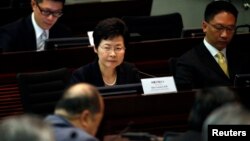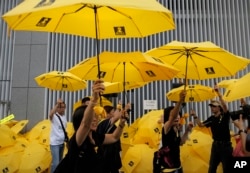Hong Kong's number two official made a good impression on some of America's most prominent think tanks last week during a rare visit to Washington.
Carrie Lam and her Hong Kong government colleagues have been facing increased scrutiny in the U.S. capital for their handling of recent political unrest in the autonomous Chinese territory.
Lam's visit to Washington from June 6 to 8 was her first since becoming Hong Kong’s chief secretary in 2012 – a visit that her boss, Chief Executive Leung Chun-ying, has yet to make since he took office that same year.
Lam had expressed some apprehension about the trip. Before flying to Washington, she told a luncheon in San Francisco that she expected to have discussions on human rights and political issues that "may not be very pleasant."
Touchy subjects
Those unpleasant issues appeared to be a reference to Hong Kong's mass pro-democracy protests that occupied major city streets for almost three months in 2014. Lam also appeared to be referring to the subsequent collapse of her government's electoral reform package in 2015 – a collapse that has left the city's democratic development in limbo.
Hong Kong's government said Lam discussed the failure of those Beijing-backed reforms during her stay in Washington. But the Hong Kong economic and trade office in the U.S. capital released few other details of Lam's closed-door conversations with U.S. think tanks, diplomats, lawmakers and business leaders.
There also was no comment on the talks from either the Obama administration or several U.S. House and Senate members contacted by VOA.
But two analysts who attended Lam's meetings with Washington research institutes spoke to VOA’s China 360 podcast and gave her positive reviews.
Impressing her audience
One of the analysts is Brookings Institution senior fellow Richard Bush. "Lam comes across as a very capable and articulate person,” he said. “She is in a really impressive command of the various issues that the Hong Kong government has to manage, and not at all naive about the problems that the territory faces."
The other analyst, The Heritage Foundation's research manager Anthony Kim, said his group discussion with Lam involved a “lively back-and-forth.”
"I think she was trying to convey the details as much as she could and I think those efforts were warmly received,” Kim said. “These kinds [of] remarks are not easy [for her] to make, but I think she conveyed a very balanced and nuanced, detailed message."
A Hong Kong press release said part of Lam's message was expressing "disappointment" that pro-democracy lawmakers vetoed the government's electoral reforms. Those lawmakers said the proposals did not give Hong Kong people what they call a "genuine" choice of candidates for chief executive.
The Hong Kong government countered by saying it was more important for its reforms to adhere to the city's constitution or Basic Law, which limits who can run for chief executive under a system of universal suffrage.
Under those Beijing-imposed limits, the only candidates who could stand for election would have to secure majority approval from a nominating committee resembling an existing body dominated by government loyalists.
Praising HK’s response
Bush of Brookings credited Lam and her colleagues for working within those rules to create what he called a "rather creative" plan.
"It created a two stage process, and it made possible consideration by the nominating committee of a range of potential candidates, including people on the pan-democratic side, of a moderate persuasion,” Bush said. “And so this created a narrow pathway for a moderate pan-democrat to be nominated and conceivably to be elected chief executive."
Since the plan was vetoed, that pathway remains closed, meaning the next chief executive to take office in 2017 will be chosen once again by government loyalists who dominate the existing committee. It is a prospect that has continued to fuel street protests by pro-democracy activists.
But Heritage researcher Kim said Lam and the Hong Kong government have been effective in keeping the situation under control.
“Hong Kong is a very dynamic economy whose rule of law is not near collapse or anything like that,” Kim said. “Despite all the downs and all the negative news we may have seen over the past months, the rule of law there - I think it has been well preserved."
US scrutiny increases
Bush said U.S. interest in the Hong Kong government's performance got a boost from media coverage of the 2014 Occupy protests. Kim said he expects that interest to grow further.
"A lot of observers in Washington will pay greater attention to the future of Hong Kong, especially getting into 2017, which will mark the 20th anniversary of Hong Kong's return to the mainland," Kim said.
Bush said another reason he and other U.S. scholars watch Hong Kong is because mainland China could draw inspiration from the way its autonomous region deals with challenges.
"In a way, what happens in Hong Kong is a leading indicator of what may happen politically in China in the long term future,” Bush said. “There are things that Beijing could learn from Hong Kong in how to govern an advanced metropolitan society. So whether there is progress in Hong Kong's political system and in maintaining its competitiveness in a globalized world is not a trivial matter."
Additional reporting by Kinnie Li in Washington.










